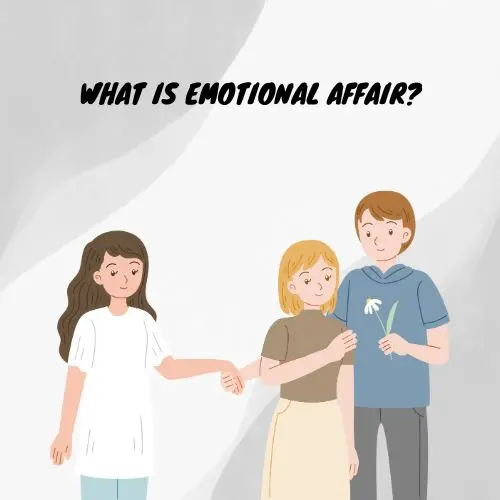Understanding Emotional Affairs
All relationships face challenges, from disagreements to periods of disconnectedness. However, some behaviors cross ethical lines and threaten the foundations of trust. This article aims to define emotional affairs, explore why they form, and offer perspective on moving forward constructively. With open communication and effort, even the most strained bonds can heal.
Emotional Affair Statistics and Facts
- 65-75% of all affairs are considered emotional rather than physical.
- 91% of those who engage in an emotional affair claim they were not looking to cheat but became close friends first.
- 70% of men and women in otherwise happy marriages risk falling into an emotional affair when their primary relationship lacks intimacy.
- Only 11% of spouses can detect when their partner is having an emotional affair, compared to 49% who can spot an intimate affair.
- Repairing trust after an emotional affair takes 1.5-2 years on average, with a committed effort from both partners through counselling.
What is an Emotional Affair?

While definitions vary, an emotional affair generally refers to an intimate connection beyond simple friendship that fulfills needs missing in a primary romantic relationship. It involves deep secrets, confidences, and an intense emotional bond with someone other than one’s partner.
Some distinguishing factors include:
- Valuing the other person’s thoughts/feelings above one’s partner.
- It’s fantasizing about being with the other person instead.
- Hiding communications or crossing appropriate boundaries.
- Feeling stronger emotions for the other, like excitement vs routine at home.
- Using the other person as a primary source of emotional support.
- Loss of intimacy with one’s actual partner.
Emotional affairs provide feelings of validation, intimacy, and escape, all while maintaining plausible deniability since no physical touch occurred. However, the outcomes fracture relationships just as profoundly as intimacy infidelity.
Why Do Emotional Affairs Form?

While excuses do not justify hurtful actions, understanding root causes can promote forgiveness and prevent repeats. Potential factors driving emotional disconnectedness include:
- Lack of quality time, affection, or emotional vulnerability with one’s partner.
- Unmet needs for engaging in conversation, laughter, and shared interests.
- Strained communication due to stresses like careers, kids, and finances.
- Self-esteem issues that prompt seeking validation outside the relationship.
- Relationship dissatisfaction left unaddressed festers into wandering eyes.
- Idealizing a “what if” scenario versus realistically fixing existing bonds.
With effort, addressing relationship gaps curbs discontent’s tendency to stray. Yet, we all remain responsible for choices that harm others, even during personal struggles.
Impact on Victims and Relationships

Going outside marriage/partnership boundaries for intimacy causes understandably deep wounds, such as:
- The devastating loss of trust that bonds were honoured.
- Doubts about the relationship history and partner’s character.
- Feelings of disloyalty, shame, and questioning one’s judgment.
- Rumination that the affair served to meet needs not being fulfilled.
- Fears that residual feelings continue for the other person.
- Constant triggers from shared locations/people as harsh reminders.
Repairing after infidelity requires time, open communication, and changed behaviour to demonstrate commitment. However, damaged trust regains strength gradually as new, healthier patterns form.
Moving Forward
Whether contemplating ending or working to rebuild relationships, certain steps promote closure and healing:
- Discuss feelings with counsellors who experienced infidelity trauma.
- Temporarily remove all means of contacting the affair partner.
- Be fully honest and answer all questions from one’s partner, however painful.
- Respect partners’ boundaries, such as access to devices/accounts.
- Show humility and accountability for actions rather than blame-shifting.
- Make amends through consistently demonstrated remorse and changed behaviour.
- Rebuild intimacy with one’s partner through quality time and acts of service.
- Accept flaws on both sides and commit to open communication in the future.
With professional guidance and commitment, rebuilding the strongest foundation possible emerges from even the deepest pains. Each day, practicing compassion – for self and others – nurtures healthy relationships to withstand life’s storms.
Preventing Future Affairs

Rather than accusations, focus on addressing the relationship needs of all parties. Suggestions include:
- Schedule regular quality time for connecting without distractions
- Define personal growth goals and support each other’s fulfilment.
- Express gratitude, affection, respect, and honesty daily with words/acts.
- Discuss issues respectfully as a team versus adversaries
- Prioritize self-care to avoid burnout that fosters emotional disconnect
- Attend counselling ahead of significant life changes to strengthen bonds proactively.
Healthy relationships require active maintenance. No bond is perfect, but intimacy and trust can flourish through all seasons of life with effort and empathy. For those seeking to rebuild after affairs, stay dedicated to growth – the courage to keep learning is always rewarded.
In Summary
Emotional and intimate affairs damage relationships, yet none of us is perfect. Wisdom lies not in judgment but in embracing humility and accountability while treating ourselves and others compassionately. Nights inevitably pass; through open communication, even the deepest wounds can heal over time. For those rebuilding trust, remember – another’s actions never define your inherent worth. Stay dedicated to each day becoming better than before; the future remains unwritten.


1 thought on “What Is An Emotional Affair? | Impact on Relationships”